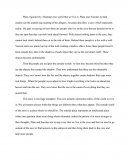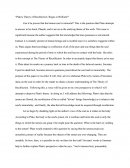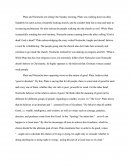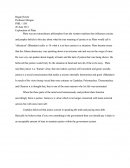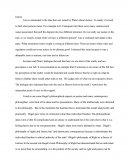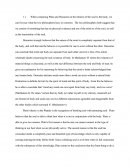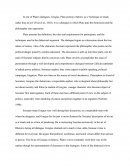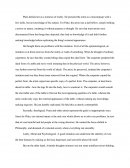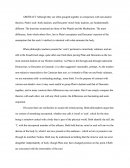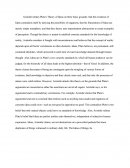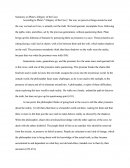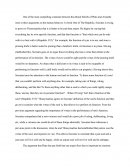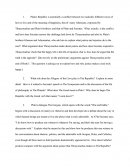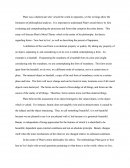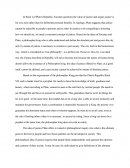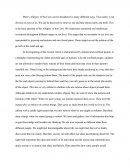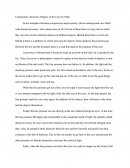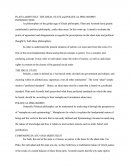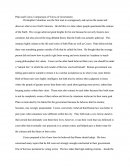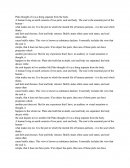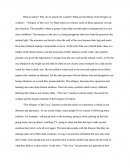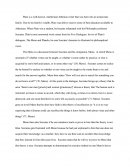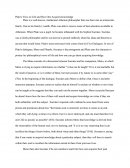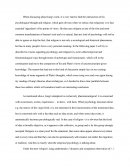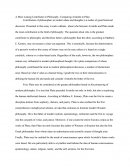Plato essays
Last update: December 3, 2015-
Plato Uses Socrates
Plato, figuratively, illustrates two world that we live in. Plato uses Socrates to help readers see the underlying meaning of the allegory. Socrates describes a cave which represents reality. He goes on saying on how there are people who live in the cave that are destined to be in this one spot that they can only look ahead forward. With chains holding them to the cave, they cannot look what's behind them or to
Rating:Essay Length: 321 Words / 2 PagesSubmitted: March 19, 2011 -
Plato's Theory of Recollection: Bogus or Brilliant?
"Plato's Theory of Recollection: Bogus or Brilliant?" Can it be proven that the human soul is immortal? This is the question that Plato attempts to answer in his book, Phaedo, and it serves as the unifying theme of the work. This issue is significant because the author suggests that the knowledge that man possesses is not learned. Instead, it is innately present in human beings and is recalled once it is somehow triggered within us.
Rating:Essay Length: 549 Words / 3 PagesSubmitted: April 27, 2011 -
Philosphy Case - Plato and Nietzsche
Plato and Nietzsche are sitting One Sunday morning, Plato was walking down an alley. Suddenly he came across a beautiful looking church, and he couldn't help but to stop and stare at its enticing architecture. He also notices the people walking into the church as well. While Plato is peacefully minding his own business, Nietzsche comes running down the alley yelling "God is dead! God is dead!" Plato acknowledging the crazy witted Nietzsche, laughs and
Rating:Essay Length: 344 Words / 2 PagesSubmitted: May 25, 2011 -
Phil 1301 - Exploration of Plato
Regan Howle Professor Morgan PHIL- 1301 20 June 2011 Exploration of Plato Plato was an extraordinary philosopher from the western tradition that influences society and peoples beliefs to this day about what the true meaning of justice or as Plato would call it "dikaisyne" (Bhandari) really is. Or what it is to have justice in a situation. Plato became aware that the Athens democracy was spiraling down at an extreme rate and was on the
Rating:Essay Length: 252 Words / 2 PagesSubmitted: June 18, 2011 -
Plato's About Justice
Justice I am so interested in the idea that was raised by Plato's about Justice. In reality it is hard to find what justices mean. For example in O.J Sampson trail there were many controversial issues associated, that pull the dispute into two different direction. Do we really see justice in the trail, or we simply accept while we have a different opinion? I am a confused individual in this topic. What sometimes looks wright
Rating:Essay Length: 713 Words / 3 PagesSubmitted: June 27, 2011 -
Plato and Descartes on the Relation of the Soul to the Body
1.) When comparing Plato and Descartes on the relation of the soul to the body, we can first see what the two philosophers have in common. The two philosophers both suggest that we consist of something that has no physical existence and are of the mind or of the soul, as well as the immortality of the soul. Descartes strongly believes that the nature of the mind is completely separate from that of the body,
Rating:Essay Length: 750 Words / 3 PagesSubmitted: June 28, 2011 -
Georgias-Critical Thinking - Plato's Dialogues
In one of Plato's dialogues, Gorgias, Plato portrays rhetoric as a "technique or knack rather than an art" (Foss et al., 2002). It is a dialogue in which Plato puts the rhetorician and the philosopher into opposition. Plato presents the definition, the rules and requirements for participants, and the techniques used in the dialectical argument. The dialogue begins as a discussion about the true nature of oratory. One of the characters Socrates represents the philosopher
Rating:Essay Length: 672 Words / 3 PagesSubmitted: June 30, 2011 -
Plato and Aristotle
Plato defined art as a mimesis of reality. He pictured the artist as a nincompoop with a few skills, but no knowledge of his subject. For Plato, the artist was a dull fellow, simply holding a mirror to nature, imitating it without purpose or thought. He saw that most artists were disconnected from the things they depicted; they had no knowledge of it and didn't bother seeking knowledge before replicating the thing's external appearance. He
Rating:Essay Length: 752 Words / 4 PagesSubmitted: July 13, 2011 -
Plato and Descrates on the Soul
ABSTRACT Although they are often grouped together in comparison with non-dualist theories, Plato's soul--body dualism, and Descartes' mind--body dualism, are fundamentally different. The doctrines examined are those of the Phaedo and the Meditations. The main difference, from which others flow, lies in Plato's acceptance and Descartes' rejection of the assumption that the soul (= intellect) is identical with what animates the body. When philosophy teachers present the '-ism's' pertinent to mind-body relations, and are still
Rating:Essay Length: 5,334 Words / 22 PagesSubmitted: August 2, 2011 -
Aristotle Refutes Plato's Theory
Aristotle refutes Plato's Theory of Ideas on three basic grounds: that the existence of Ideas contradicts itself by denying the possibility of negations; that his illustrations of Ideas are merely empty metaphors; and that they theory uses impermanent abstractions to create examples of perception. Though the theory is meant to establish concrete standards for the knowledge of reality, Aristotle considers it fraught with inconsistencies and believes that the concept of reality depends upon all forms'
Rating:Essay Length: 286 Words / 2 PagesSubmitted: August 10, 2011 -
Summary on Plato's Allegory of the Cave
Summary on Plato's Allegory of the Cave According to Plato's "Allegory of the Cave," the way we perceive things around us and the way we lead our lives, is actually not the truth. We lead ignorant, incomplete lives, following the paths, rules, and ethics, set by the previous generations, without questioning them. Plato brings up this dilemma of humans by portraying them as prisoners in a cave. These prisoners are sitting facing a wall, tied
Rating:Essay Length: 608 Words / 3 PagesSubmitted: August 14, 2011 -
Plato Vs Aristotle
One of the most compelling contrasts between the ethical beliefs of Plato and Aristotle rests in their arguments on the human behavior. In book One of The Republic, Socrates is trying to prove to Thrasymachus that it is better to be just than unjust. He begins by saying that everything has its own specific function, and that that function is "that which one can do only with it or best with it (Republic 352)." For
Rating:Essay Length: 1,034 Words / 5 PagesSubmitted: September 13, 2011 -
Plato's Republic
1. Plato's Republic is essentially a conflict between two radically different views of how to live and of the meaning of happiness, that of many Athenians, expressed by Thrasymachus and Plato's brothers, and that of Plato and Socrates. What, exactly, is the conflict and how does Socrates answer the challenge laid down by Thrasymachus and also by Plato's brothers Glaucon and Adeimantus, who ask him to explain what justice and injustice do to the soul?
Rating:Essay Length: 352 Words / 2 PagesSubmitted: November 4, 2011 -
Plato Case
Plato was a dialectician who viewed the world in opposites, yet his writings allow the formation of philosophical analysis. It is important to understand Plato's moral theory by first evaluating and comprehending the processes and forms that comprise the entire theory. This essay will discuss Plato's Moral Theory which is the center of his philosophy, his theory regarding forms - 'how best to live', as well as describing the pursuit of happiness. A definition of
Rating:Essay Length: 1,801 Words / 8 PagesSubmitted: December 8, 2011 -
Plato's True Philosophy
In Book I of Plato's Republic, Socrates questions the value of justice and argues justice is for own sick rather than for deliberate personal benefits. In Apology, Plato suggests that justice cannot be reducible to people's opinions and in order for justice to be compelling in directing how we should act, we need a consistent concept of justice. Based on the ideas of Socrates and Plato, a philosopher king who is able understand and define
Rating:Essay Length: 862 Words / 4 PagesSubmitted: December 11, 2011 -
Plato's Allegory of the Cave
Plato's Allegory of the Cave can be deciphered in many different ways. True reality is not obvious in most of us. We can be deceived on what we see and hear about reality and truth. This is the basic premise of the Allegory of the Cave. We experience emotional and intellectual revelations throughout different stages in our lives. The stages that we encounter in our lives are represented by growing realizations and new found pains.
Rating:Essay Length: 440 Words / 2 PagesSubmitted: March 10, 2012 -
Commentary About the Allegory of the Cave by Plato
Commentary about the Allegory of the Cave by Plato In this metaphor Socrates compared an unjust society with an underground cave filled with chained prisoners, who cannot move at all. In front of them there is a big wall on which they can only see the reflected shadows of different objects. Behind them there is a fire and behind it there is a platform in which men pass the objects whose shadows the prisoners see.
Rating:Essay Length: 875 Words / 4 PagesSubmitted: April 5, 2012 -
Plato-Aristotle: The Ideal State and Political Philosophy
PLATO-ARISTOTLE: THE IDEAL STATE and POLITICAL PHILOSOPHY INTRODUCTION As philosophers of the golden age of Greek philosophy, Plato and Aristotle have greatly contributed to political philosophy, aside other areas. In this write-up, I intend to evaluate the points of agreement and disagreement as regards the prescriptions on the ideal state and political thought by both these philosophers. In order to understand the present situation of politics we must start from the roots of it. One
Rating:Essay Length: 767 Words / 4 PagesSubmitted: August 4, 2012 -
Plato and Cicero; Comparison of Views on Government
Plato and Cicero; Comparison of Views on Government Christopher Columbus was the first man to courageously sale across the ocean and discover what is now North America. He did this in a time where people questioned the contour of the Earth. His voyage achieved great heights for his era because he not only found a new continent, but also proved the long debated theory that the Earth was actually spherical. This instance highly relates to
Rating:Essay Length: 1,909 Words / 8 PagesSubmitted: October 1, 2012 -
Plato Thought of It as a Thing Separate from the Body
Plato thought of it as a thing separate from the body. A human living on earth consists of two parts, soul and body. The soul is the essential part of the human - what makes me me. It is the part to which the mental life of humans pertains - it is the soul which thinks and feels and chooses. Soul and body interact. Bodily states often cause soul states, and soul states often cause
Rating:Essay Length: 454 Words / 2 PagesSubmitted: December 9, 2012 -
The Cave - the Allegory of the Cave - Plato Case
What is reality? Why do we search for wisdom? What are the effects of the bringers of wisdom? "Allegory of the Cave" by Plato helps us to answer some of these questions we may ask ourselves. This parable is about a group of men that are held captive underground in a cave since childhood. The entrance to the cave is a long passageway that rises from the ground to the outside light. The prisoners are
Rating:Essay Length: 1,302 Words / 6 PagesSubmitted: February 8, 2013 -
Plato's View on Life and How one Acquires Knowledge
Plato is a well-known, intellectual Athenian writer that was born into an aristocratic family. Due to his family's wealth, Plato was able to receive some of best education available to Athenians. When Plato was a student, he became infatuated with his Philosophy professor Socrates. Plato's most renowned work comes from his Five Dialogues. In two of Plato's dialogues, The Meno and Phaedo, he uses Socrates' character to illustrate his philosophical views. The Meno is a
Rating:Essay Length: 918 Words / 4 PagesSubmitted: March 25, 2013 -
Plato's View on Life and How one Acquires Knowledge
Plato's View on Life and How One Acquires Knowledge Plato is a well-known, intellectual Athenian philosopher that was born into an aristocratic family. Due to his family's wealth, Plato was able to receive some of best education available to Athenians. When Plato was a pupil, he became infatuated with his Sophist Socrates. Socrates was a Greek philosopher and he was known to preach endlessly about his ideas and theories to anyone that would listen. Plato's
Rating:Essay Length: 867 Words / 4 PagesSubmitted: March 25, 2013 -
Jung - Plato Case
When discussing about Jung's work, it is very hard to find the intersection of his psychological thought and religion, which gets obvious when we notice, that religiosity is in fact essential 'ingredient' of his points of views. He thus sees religion as one of the first and most common manifestations of human's soul and it is natural, that any kind of psychology will not be able to ignore or skip the fact, that religion is
Rating:Essay Length: 1,068 Words / 5 PagesSubmitted: June 4, 2013 -
A More Lasting Contributor to Philosophy: Comparing Aristotle to Plato
A More Lasting Contributor to Philosophy: Comparing Aristotle to Plato Contribution of philosophers to modern ideas and thoughts is a matter of great historical discourse. Presented in this essay is such a debate - about who between Aristotle and Plato made the most contribution to the field of philosophy. The question about who is the greatest contributor to philosophy and therefore better a philosopher than the other, according to Matthew E. Kenney, may not assume
Rating:Essay Length: 589 Words / 3 PagesSubmitted: May 4, 2014
